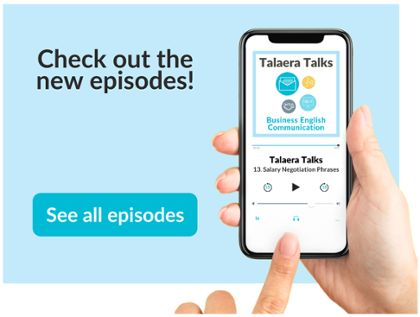By Paola Pascual & Simon Kennell on Nov 8, 2021 11:46:44 AM
The notion of holding people accountable can be scary, especially if you are not communicating in your main language. How do you tell someone that they're not doing a good job? Being a manager is easy when it's all fun, and everybody's doing well, and everything's going fine. But when you have to hold people accountable - How do you do that?
Accountability in the workplace is a great way to empower your employees to find the best way to achieve their goals. Holding your teams responsible for their actions will increase their commitment and boost their morale. And yet, accountability is done rather poorly in today's workplace. Simon brings us excellent communication advice for managers (or aspiring ones) on how to build accountability among your teams. Listen to this Talaera Bit (aka short podcast episode) and read the notes below.
What is accountability?
Accountability in the workplace is about ownership and responsibility. It is about setting expectations and holding employees (regardless of their level) responsible for living up to them. Accountability is based on trust and, while it is an essential trait of high-performing teams, it should be balanced with employee autonomy –as, for employees to take ownership of their work, they must feel empowered to make their own decisions.
4 steps to promote accountability in the workplace
Building accountability involves proactive communication, informed trust, and a nice balance between empathy and assertiveness. What happens when a colleague didn't do the thing they said they would do? What happens when an employee is not working up o the level you had discussed and they had promised?
#1 Use objective facts
Come up with clear, specific examples of what happened (what they promised they would do but didn't, what went wrong, what didn't go as expected). Using objective facts means mentioning specific numbers or dates and describing the situation using empirical examples. It shows that you have done your homework and that you care about the specifics, without judging the other person or generalizing. Your teams will be more prone to be held accountable when it comes to events ("this bad thing happened") rather than personal traits ("you are unprofessional").
- Vague, subjective: "You have been unprofessional lately" or "You've been late a lot recently"
- Specific, objective: "You've been late four times in the last week and a half, and that's affecting our customers for this and this reason".
#2 Balance YOU and WE
Try to balance the use of personal pronouns. It is totally fine to say "you did X and Y", but only using "YOU" may make the other person more evasive and less open to hearing your feedback. Combine it with "WE" –it shows that you are invested in the process of improvement and that you are willing to help. It sets the tone from authoritative to collaborative.
- Unbalanced, authoritative: "I've seen that you've done a really poor job. And, you know, I don't know what we can do about this".
- Balanced, collaborative: "Okay, we've talked about that. We would work on improving X, Y, and Z, and you haven't really done these things as we talked about. So what can we do to improve this?"
#3 Show empathy
When we want to hold people accountable, we don't want to be too nice. But we also don't want to come across too harsh. A good way to think about doing this is to put empathy before assertiveness. Show that you understand the situation first and that you believe in them before bringing in in the harder assertiveness. For that, you can use phrases like "I understand" or "I see that..."
- Showing empathy: "Okay, I understand, you have a lot going on right now. And I see how hard you're working" or "Listen, Sara, you know, I see that you're coming in early. And I see that you're working very hard, and that's great."
#4 Be assertive
Once you've shown that you are invested and that you truly care, you need to make a shift from empathy to assertiveness, which involves being a little bit harder. To create that bridge, you can use phrases like, "however," "with that being said", or "having said that"... This is a fundamental aspect of promoting assertiveness.
- Being assertive: "That being said, we talked about you playing a much more central role in the team and work together more with the team. But you haven't been to the three team meetings that you've been scheduled to go to. So I am not sure what happened. How can we figure this out?"
Examples of accountability following these four steps
"Okay, I understand that you have a lot going on right now. And I see how hard you're working. However, we made an agreement that you would be spending 10 hours a week meeting with the team to align on the next steps, but that hasn't happened. What can we do to figure out something that's going to work for everybody?"
"Listen, Sara, you know, I see that you're coming in early. And I see that you're working very hard. And that's great. And I see how passionate you are about what you're doing. That being said, we talked about you playing a much more central role in the team and working together more with the team. But you haven't been to the three team meetings that you've been scheduled to go to. So I'm not sure what's going on. How can we figure this out?"
This article works as supporting material for our podcast episode on how to promote accountability at work. You can read the transcript below. Make sure you check out all our other Talaera Talks episodes and subscribe to get new episode alerts.
Keep improving your communication skills for the workplace
Continue improving your communication skills for professional situations - get in touch with Talaera. If you wish to take your professional English communication skills to the next level, here are some valuable resources:
- Personalized English training - 1:1 sessions, group courses, or company webinars tailored to your needs
- Free webinars - monthly live sessions with one of our communication experts
- Free communication guides - keep developing your skills with our free ebooks on business English communication
For any additional information or questions, you can also reach out at info@talaera.com. Interested in getting the best offers and receiving free content on Business English communication? Subscribe to our newsletter and we will keep you in the loop with offers, free events, and development materials!
If you enjoyed this article, keep reading:
- 7 Tips On How To Communicate Better With US Americans [Podcast]
- 'Stay safe' - How to Send Actually Genuine Emails During the Pandemic
- Useful Answers to Business English Top Questions - Expert Advice
- How To Learn The Difference Between 'Really' And 'Very'?
- 150+ Useful Email Phrases That Will Make Your Life Easier
- 14 Simple Rules That Will Make You A Better Communicator
- Learning Business English? +20 Top Tips You Need To Know
Talaera Talks - Transcript Episode 28
If you are learning English, including new English words and expressions will help you with effective communication. Remember to check out our other episodes on how to make small talk, how to deliver engaging presentations, how to speak English fluently, and many more: visit the podcast website. Listen to it on your favorite platform.
Intro
Welcome to Talaera Talks, the business English communication podcast for non-native professionals. My name is Paola and I am co-hosting this show with Simon. In this podcast, we're going to be covering communication advice and tips to help express yourself with confidence in English in professional settings. So we hope you enjoy the show!
0:24
Welcome back to another Talaera Bit. My name is Simon, I hope wherever you are, you are having a great day, a great week, a great month. Let's get into our Talaera Bit today. So today we're talking about something which I think for anybody is difficult. I know it is for me, especially if you're a manager or a new manager... The notion of holding people accountable. It can be scary. I think it can be scary. I mean, how do you tell someone that they're not doing a good job? Being a manager is easy, right? When it's all fun, and everybody's doing well, and everything's going fine. But when you have to hold people accountable - How do you do that?
1:15
So what do we mean by holding people accountable? By holding people accountable? We mean people either in your team or can also be even your colleagues who didn't do the thing that they said they would do, or they're not working up to the level that you had discussed, and they had promised?
1:36
So how do we bring that up? Well, there's a couple (of) things that we should take into consideration. You know, when we do that, number one is, we want to use OBJECTIVE FACTS, which means we want to come with clear examples of what they didn't do. Right? So instead of, you know, "You've just been late a lot recently". Instead of that, saying, "Okay, you've been late four times in the last week and a half. And that's affecting our customers by this and this reason". So there, you're using numbers four times, that's something that obviously you clearly have looked at, and this person can't disagree with that, right. And it makes it in a way, it makes it much more real, because it's very objective.
2:30
As well, you want to show that you're invested. So you've used numbers, you've kind of given those cold, hard facts to that person. And then you also want to show that you are invested. And a good way to do that is by USING YOU AND WE, right? So the balance there is very important. Not, "I've seen that you've done a really poor job. And, you know, I don't know what we can do about this". So there instead of using a lot of that YOU and a lot of that I, we can say, "Okay, WE talked about that, WE would work on improving XY and Z. YOU haven't really done these things like WE talked about. So what can WE do to improve this?" So thereby using WE, I'm bringing this person into it, I'm showing that I'm invested in this process of their improvement, right? So these few things we're taking into consideration, right, using objective facts, a good way to do that is to use numbers, balancing this 'you' and 'we' and doing that with showing that you're invested.
3:45
So how does this look? I mean, when we get down to it, we don't want to be too nice. But we also don't want to come across too harsh. A good way to think about doing this is to put EMPATHY before assertiveness. Okay, so that means to show that we understand and then bring in the hard, cold assertiveness, right, that shows that okay, if I'm an employee, and my manager says something like, "Okay, I understand, you have a lot going on right now. And I see how hard you're working. However, we made an agreement that you would be working this many days a week and working this many hours. So that's not really happened, what's going on and what can we do to maybe figure out something that's going to work for everybody?" So there I'm using the empathy of 'I understand that you have a lot going on and I see how hard you're working'.
3:53
But then we need to create a little bridge or we need to create a shift from empathy to ASSERTIVENESS which is being a little bit more hard, which is, we can do that with saying something like, "however", or, "with that being said", or "having said that"... Okay, so if I'm a manager and I need to hold an employee accountable, I can say something like, "Listen, Sara, you know, I see that you're coming in early. And I see that you're working very hard. And that's great. And I see how passionate you are about what you're doing. That being said, we talked about that, you would play a much more central role in the team and work together more with the team. But you haven't been to the three-team meetings that you've been scheduled to go to. So I mean, I don't I don't know what's going on. How can we maybe figure this out? Or what's going on?" So there, I'm holding Sarah accountable. I'm providing empathy by telling her that I see how hard she works and how passionate she is. And then I'm creating that switch with having said that, you haven't been to the three key meetings, the three-team meetings that we talked about, and what's going on, right? So there I'm holding Sarah accountable. At the same time, I'm showing that I care about her and that I appreciate the work she does.
6:30
So what did we talk about today? We talked about that we want to use cold, hard objective facts, use the numbers if you can, you want to show that you're invested. And balance YOU and WE together to show that it's we and not so much you and I that shows that I'm invested. And as well remember, we want to put the empathy before the assertiveness, so nice, then sour and what does that do during the night and then sour makes that last moment that we talked about actionable. That means that okay, I clearly understand that my manager cares about me. But I need to do this. Now. I need to get started on this. So being assertive as a manager can be tough, but it can be done. Alright, so again, as always listened to this a couple times, if that helps. And yeah, write in if you have any great ideas, and as always, keep learning.
7:36
And that's all we have for you today. We hope you enjoyed it, and remember to subscribe to Talaera Talks. We'll be back soon with more! And visit our website at https://talaera.com for more valuable content on business English. You can also request a free consultation on the best ways for you and your team to improve your communication skills. So have a great day and keep learning!



.png?width=200&name=listen-on-spotify%20(1).png)



comments